#translation literature
Text
The Three
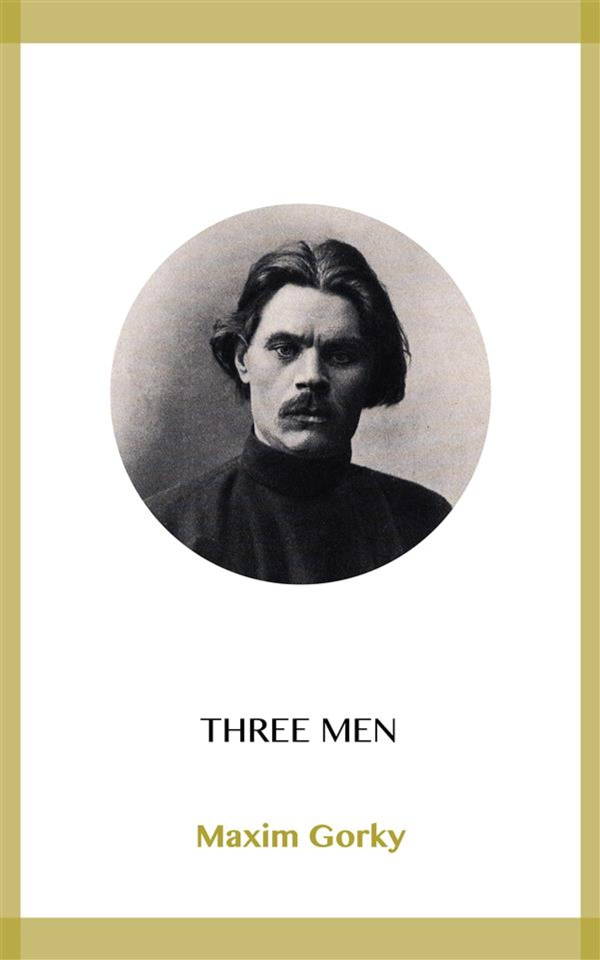
It's been a long time since I've read a Russian author. And of course, in translation. Gorky's edited short stories and Mother are already ticked off in my list, and this i didn't know about from before. Immediately as I started reading this, i saw young minds being absolutely crushed and trapped by the forces of society. They learn about selfishness, greed, lust and cowardice all too soon. And there is the young girl Masha too, who swiftly gets lost in the hubbub of a misogynist society that couldn't care less for her. The preface tells me only Pavel was able to find truth in life, but i doubt that. Yakov was not meant for this world. For him, truth was in his constant curiosity, a dangerous agnosticism and a yearning for education that his innkeeper father squashed in the innkeeping responsibilities he imposed on him. I thought Ilya was the most likely candidate to find his truth in life, but his is a pathetic effort. He desires his whole childhood for a clean civilised existence but is brutally disillusioned by the utter filth of bourgeois lives. The only consolation, he didn't have to bear this realisation for too long. Pavel, on the other hand, is lost, just like poor Masha is, towards the end of the novel. He has no recognisable destination or end goal, which is perhaps the truth he was pursuing, that there isn't a final one. Gorky will literally make you cry out in pain and contort yourself in empathy if you allow him to, just like his characters do.
#books#reading#currently reading#russian literature#maxim gorky#translation literature#the three#three men#marxist literature#marxism#impressions not reviews
3 notes
·
View notes
Text

Julia de Burgos, tr. by Jack Agüeros, from Song of the Simple Truth: The Complete Poems of Julia de Burgos; "Moments"
[Text ID: “Me, inside myself, / always waiting for something / that my mind can’t define.”]
#julia de burgos#excerpts#writings#literature#poetry#fragments#selections#words#quotes#poetry collection#typography#poetry in translation#puerto rican poetry#puerto rican literature
8K notes
·
View notes
Text

"A Shirt Made of Fire", Vardges Petrosyan (translated by metamorphesque)
#quotes#literature#translated literature#vardges petrosyan#armenian literature#my translations#a shirt made of fire#classic literature#dark academia#romantic academia
9K notes
·
View notes
Text

Pengakuan
judul asli : Confession
penyair : Craig Morgan Teicher
buku : to Keep Love Blurry
terjemah bebas oleh : Ramadhan A
lowell melakukannya dengan baik karena ia mengerti, meskipun kepiawaiannya berkata
"aku pernah seburuk itu,"
ia tetaplah harus tampil sempurna.
tiada yang mencintai seseorang yang membenci dirinya sendiri,
seorang yang kuat, dan semua pesona atas minat seseorang pada kejahatannya sendiri
yang ia tumpahkan pada pertunjukan bagi yang terluka olehnya, atau
bagi mereka yang belum pernah dan menjadi sasaran selanjutnya.
Si pemberani,
bintang rock,
pawang sirkus yang piawai,
yang membakar dirinya dengan api tiap malam.
lalu dipadamkan dengan tangisan penontonnya. Unik!
itulah tipuan yang mereka sukai;
ia baik-baik saja.
karena ia mencintai dirinya, kebencian yang dipermainkan.
seorang pembenci diri sejati,
yang memkau rumah-rumah kosong,
terlambat.
#puisi#poems on tumblr#sastra#poem#poetry#english literatur#english poetry#translation literature#indonesian bahasa translation#terjemah bebas#free translation#sastra indonesia
0 notes
Text
Okay, let me tell you a story:
Once upon a time, there was a prose translation of the Pearl Poet’s Sir Gawain and the Green Knight. It was wonderfully charming and lyrical and perfect for use in a high school, and so a clever English teacher (as one did in the 70s) made a scan of the book for her students, saved it as a pdf, and printed copies off for her students every year. In true teacher tradition, she shared the file with her colleagues, and so for many years the students of the high school all studied Sir Gawain and the Green Knight from the same (very badly scanned) version of this wonderful prose translation.
In time, a new teacher became head of the English Department, and while he agreed that the prose translation was very wonderful he felt that the quality of the scan was much less so. Also in true teacher tradition, he then spent hours typing up the scan into a word processor, with a few typos here and there and a few places where he was genuinely just guessing wildly at what the scan actually said. This completed word document was much cleaner and easier for the students to read, and so of course he shared it with his colleagues, including his very new wide-eyed faculty member who was teaching British Literature for the first time (this was me).
As teachers sometimes do, he moved on for greener (ie, better paying) pastures, leaving behind the word document, but not the original pdf scan. This of course meant that as I was attempting to verify whether a weird word was a typo or a genuine artifact of the original translation, I had no other version to compare it to. Being a good card-holding gen zillenial I of course turned to google, making good use of the super secret plagiarism-checking teacher technique “Quotation Marks”, with an astonishing result:
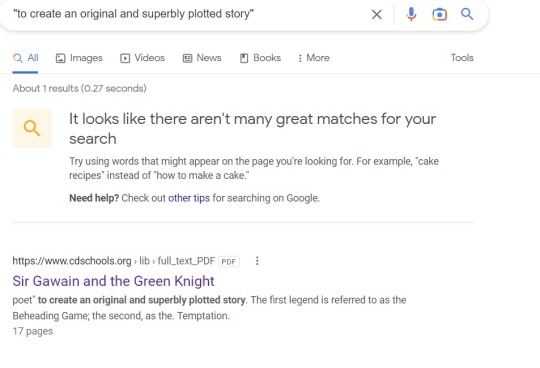
By which I mean literally one result.
For my purposes, this was precisely what I needed: a very clean and crisp scan that allowed me to make corrections to my typed edition: a happily ever after, amen.
But beware, for deep within my soul a terrible Monster was stirring. Bane of procrastinators everywhere, my Curiosity had found a likely looking rabbit hole. See, this wonderfully clear and crisp scan was lacking in two rather important pieces of identifying information: the title of the book from which the scan was taken, and the name of the translator. The only identifying features were the section title “Precursors” (and no, that is not the title of the book, believe me I looked) and this little leaf-like motif by the page numbers:
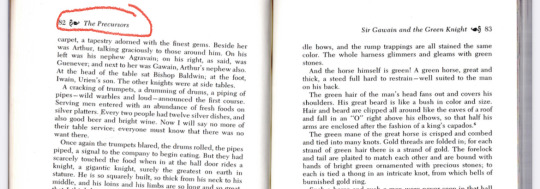
(Remember the leaf. This will be important later.)
We shall not dwell at length on the hours of internet research that ensued—how the sun slowly dipped behind the horizon, grading abandoned in shadows half-lit by the the blue glow of the computer screen—how google search after search racked up, until an email warning of “unusual activity on your account” flashed into momentary existence before being consigned immediately and with some prejudice to the digital void—how one third of the way through a “comprehensive but not exhaustive” list of Sir Gawain translators despair crept in until I was left in utter darkness, screen black and eyes staring dully at the wall.
Above all, let us not admit to the fact that such an afternoon occurred not once, not twice, but three times.
Suffice to say, many hours had been spent in fruitless pursuit before a new thought crept in: if this book was so mysterious, so obscure as to defeat the modern search engine, perhaps the answer lay not in the technologies of today, but the wisdom of the past. Fingers trembling, I pulled up the last blast email that had been sent to current and former faculty and staff, and began to compose an email to the timeless and indomitable woman who had taught English to me when I was a student, and who had, after nearly fifty years, retired from teaching just before I returned to my alma mater.
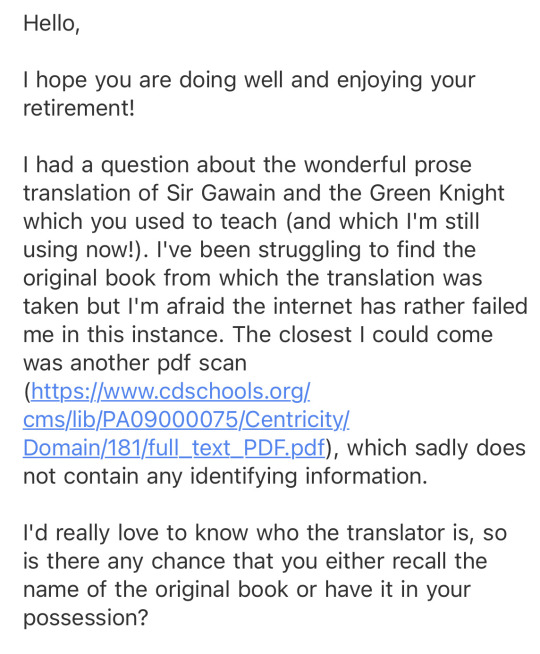
After staring at the email for approximately five or so minutes, I winced, pressed send, and let my plea sail out into the void. I cannot adequately describe for you the instinctive reverence I possess towards this teacher; suffice to say that Ms English was and is a woman of remarkable character, as much a legend as an institution as a woman of flesh and blood whose enduring influence inspired countless students. There is not a student taught by Ms. English who does not have a story to tell about her, and her decline in her last years of teaching and eventual retirement in the face of COVID was the end of an era. She still remembers me, and every couple months one of her contemporaries and dear friends who still works as a guidance counsellor stops me in the hall to tell me that Ms. English says hello and that she is thrilled that I am teaching here—thrilled that I am teaching honors students—thrilled that I am now teaching the AP students. “Tell her I said hello back,” I always say, and smile.
Ms. English is a legend, and one does not expect legends to respond to you immediately. Who knows when a woman of her generation would next think to check her email? Who knows if she would remember?
The day after I sent the email I got this response:

My friends, I was shaken. I was stunned. Imagine asking God a question and he turns to you and says, “Hold on one moment, let me check with my predecessor.”
The idea that even Ms. English had inherited this mysterious translation had never even occurred to me as a possibility, not when Ms. English had been a faculty member since the early days of the school. How wonderful, I thought to myself. What a great thing, that this translation is so obscure and mysterious that it defeats even Ms. English.
A few days later, Ms. English emailed me again:
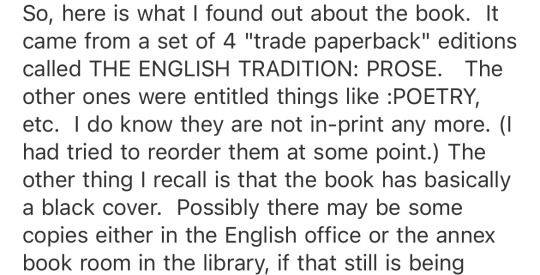
(I had, in fact searched through both the English office and the Annex—a dark, weirdly shaped concrete storage area containing a great deal of dust and many aging copies of various books—a few days prior. I had no luck, sadly.)
At last, though, I had a title and a description! I returned to my internet search, only to find to my dismay that there was no book that exactly matched the title. I found THE BRITISH TRADITION: POETRY, PROSE, AND DRAMA (which was not black and the table of contents I found did not include Sir Gawain) and THE ENGLISH TRADITION, a super early edition of the Prentice Hall textbooks we use today, which did have a black cover but there were absolutely zero images I could find of the table of contents or the interior and so I had no way of determining if it was the correct book short of laying out an unfortunate amount of cold hard cash for a potential dead end.
So I sighed, and relinquished my dreams of solving the mystery. Perhaps someday 30 years from now, I thought, I’ll be wandering through one of those mysterious bookshops filled with out of print books and I’ll pick up a book and there will be the translation, found out last!
So I sighed, and told the whole story to my colleagues for a laugh. I sent screenshots of Ms. English’s emails to my siblings who were also taught by her. I told the story to my Dad over dinner as my Great Adventure of the Week.
…my friends. I come by my rabbit-hole curiosity honestly, but my Dad is of a different generation of computer literacy and knows a few Deep Secrets that I have never learned. He asked me the title that Ms. English gave me, pulled up some mysterious catalogue site, and within ten minutes found a title card. There are apparently two copies available in libraries worldwide, one in Philadelphia and the other in British Columbia. I said, “sure, Dad,” and went upstairs. He texted me a link. Rolling my eyes, I opened it and looked at the description.
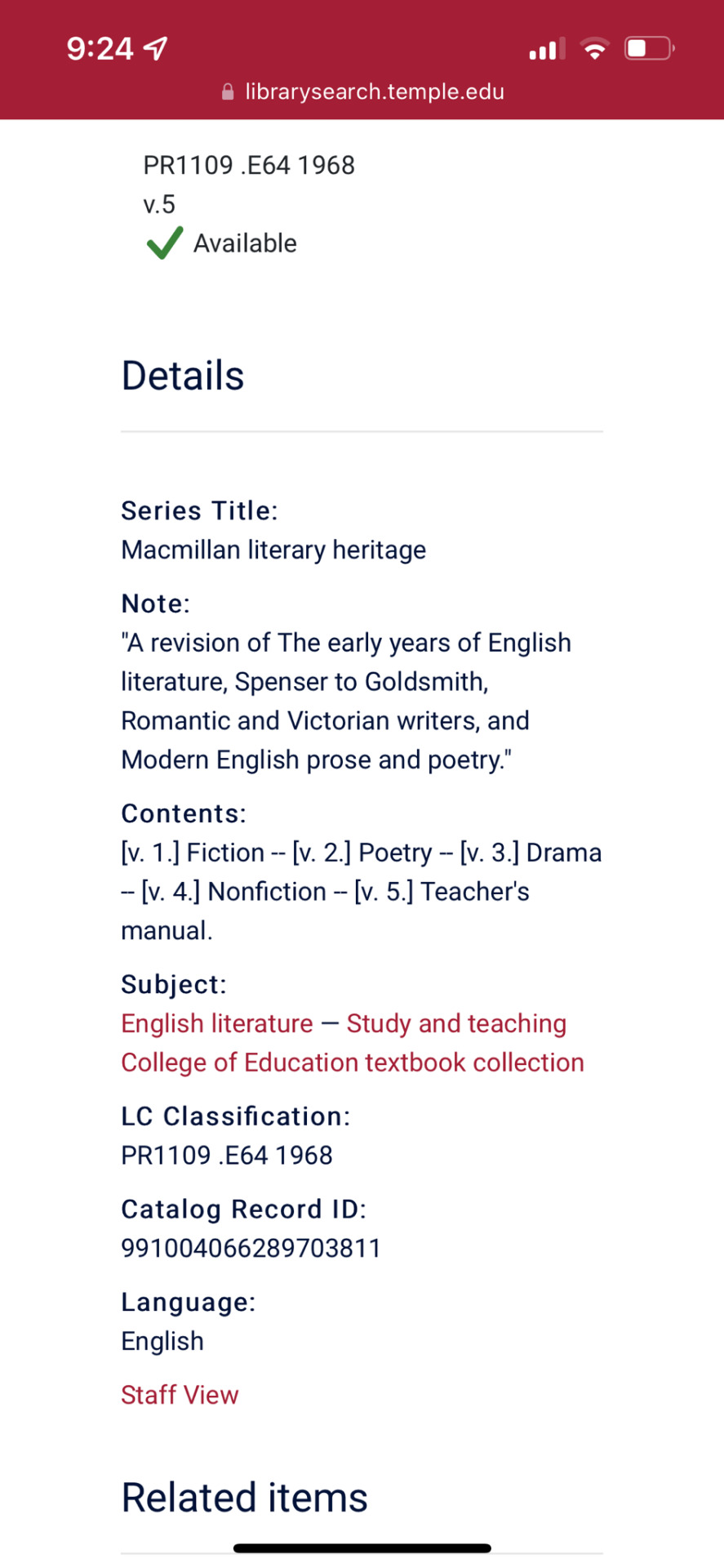
Huh, I thought. Four volumes, just like Ms. English said. I wonder…
Armed with a slightly different title and a publisher, I looked up “The English Tradition: Fiction macmillan” and the first entry is an eBay sale that had picture of the interior and LO AND BEHOLD:
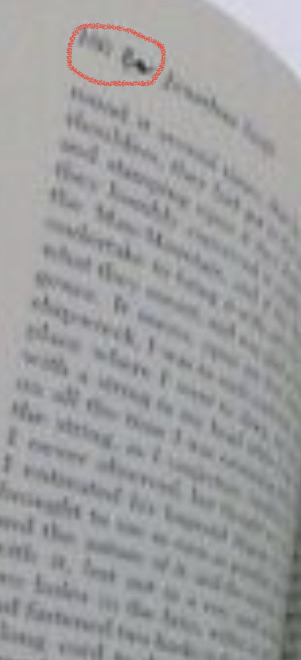
THE LEAF. LOOK AT THE LEAF.
My dad found it! He found the book!!
Except for one teensy tiny problem which is that the cover of the book is uh a very bright green and not at all black like Ms. English said. Alas, it was a case of mistaken identity, because The English Tradition: Poetry does have a black cover, although it is the fiction volume which contains Sir Gawain and the Green Knight.
And so having found the book at last, I have decided to purchase it for the sum of $8, that ever after the origins of this translation may once more be known.
In this year of 2022 this adventure took place, as this post bears witness, the end, amen.
(Edit: See here for part 2!)
#sir gawain and the green knight#translations#internet research#english literature#teaching things#dads are the best#long post#story telling#I STILL don’t know the name of the translator but I WILL find out#obscure books
21K notes
·
View notes
Text
Help save the Yiddish Translation Fellowship Program

I wanted to ask my followers and fellow language enthusiasts to donate to the Yiddish Book Center so that they can continue to train translators and make Yiddish literature accessible (or at least share this post if possible) 🐐
#langblr#Lingblr#Yiddish#Jumblr#Translation Studies#Translator#jewish literature#Boost#Yiddish Book Center#ייִדיש
4K notes
·
View notes
Text

Clara Janés Nadal, tr. by Carol Thickstun & Louis Burne, from "I Don't Know,"
#lit#clara janes nadal#poetry#quote#words#poetry in translation#fragments#selections#spanish literature#excerpt#p
2K notes
·
View notes
Text

And perhaps whatever you hope for will come true.
2K notes
·
View notes
Text

White Nights, Fyodor Dostoevsky
#english lit#english literature#russian literature#fyodor dostoevsky#dostoevksy#translated#translated literature#russia#white nights#white nights by fyodor dostoevsky#lit#english#novels#short story
2K notes
·
View notes
Text

#franz kafka#letters to milena#dark academia#quotes#spilled words#spilled thoughts#dark aesthetic#text#words#dark acadamia aesthetic#aesthetic#quotes to live by#quote#classic lit#lit#classics#kafkaesque#the metamorphosis#translated literature#daily kafka#letters
6K notes
·
View notes
Text
Bedanabala

The subtitle 'Her life. Her times.' suggests an autobiographical bent. However, the old narrator recounts the story mainly of her mother and her times. In fact, of her mother and her (surrogate) mother who was a victim of her 'mashi'. Indeed, the story goes back centuries, as long as there have been whores. Mahasweta Devi (and the translator rightfully retains the original Bengali words here) enumerates the different names which since the beginning of time have been used for those who are now called sex workers. If this small book is a little pedantic, it very well should be, because these 'fallen' women fall and stay fallen because men from noble families keep visiting and abusing them in secret. Sin gets transferred and branded onto the weaker sex who work only for their survival. Social work and the freedom struggle get intertwined in the whorehouses in the years leading up to India's independence, and yes, it should not surprise you that these women have heart and guts enough to shelter wounded rebels at the risk of getting raped by police officials. The lucidity of Devi's language is perhaps lost in translation, but its power is not. Bedanabala may be one special individual whose mother was born in a zamindar family, raised in a whore house, and married by a renegade but kind zamindar, but her life derives only from all those women who have come before her and struggled for their right to light.
#books#reading#currently reading#postcolonial literature#mahasweta devi#translation literature#translation#pre independence#indian literature#bedanabala#equality#historical fiction#impressions not reviews
2 notes
·
View notes
Text

Julia de Burgos, tr. by Jack Agüeros, from Song of the Simple Truth: The Complete Poems of Julia de Burgos; "To Julia de Burgos"
[Text ID: "in all my poems I undress my heart."]
#julia de burgos#excerpts#writings#literature#poetry#fragments#selections#words#quotes#poetry collection#typography#poetry in translation#puerto rican literature#puerto rican poetry
6K notes
·
View notes
Text

― Fyodor Dostoevsky, The Brothers Karamazov
#quotes#literature#classic literature#translated literature#fyodor dostoevsky#russian literature#russian classics#the brothers karamazov
12K notes
·
View notes
Text
The tender, dreamy girl - in books she seeks and finds her dreams.
— Alexander Pushkin, Eugene Onegin (1833)
#i finally got around to nabokov's infodump#or 'translation'#vlad...you need to put down the pen#eugene onegin#alexander pushkin#literature
2K notes
·
View notes
Text
list of medieval literature with links to read.
i’ll continue to update with more texts, better scans, & different editions. enjoy!
#arthurian legend#arthurian legends#arthuriana#ulster cycle#history#medieval literature#med lit#illuminated manuscript#illuminated manuscripts#translations#translation#english translations#english translation#resource#resources#book recommendations#book reccs#arthurian preservation project#my post
1K notes
·
View notes
Text
None Of You Know What Haiku Are
I'm going to preface this by saying that i am not an expert in ANY form of poetry, just an enthusiast. Also, this post is... really long. Too long? Definitely too long. Whoops! I love poetry.
If you ask most English-speaking people (or haiku-bot) what a haiku is, they would probably say that it's a form of poetry that has 3 lines, with 5, and then 7, and then 5 syllables in them. That's certainly what I was taught in school when we did our scant poetry unit, but since... idk elementary school when I learned that, I've learned that that's actually a pretty inaccurate definition of haiku. And I think that inaccurate definition is a big part of why most people (myself included until relatively recently!) think that haiku are kind of... dumb? unimpressive? simple and boring? I mean, if you can just put any words with the right number of syllables into 3 lines, what makes it special?
Well, let me get into why the 5-7-5 understanding of haiku is wrong, and also what makes haiku so special (with examples)!
First of all, Japanese doesn't have syllables! There's a few different names for what phonetic units actually make up the language- In Japanese, they're called "On" (音), which translates to "sound", although English-language linguists often call it a "mora" (μ), which (quoting from Wikipedia here) "is a basic timing unit in the phonology of some spoken languages, equal to or shorter than a syllable." (x) "Oh" is one syllable, and also one mora, whereas "Oi" has one syllable, but two moras. "Ba" has one mora, "Baa" has two moras, etc. In English, we would say that a haiku is made up of three lines, with 5-7-5 syllables in them, 17 syllables total. In Japanese, that would be 17 sounds.
For an example of the difference, the word "haiku", in English, has 2 syllables (hai-ku), but in Japanese, はいく has 3 sounds (ha-i-ku). "Christmas" has 2 syllables, but in Japanese, "クリスマス" (ku-ri-su-ma-su) is 5 sounds! that's a while line on its own! Sometimes the syllables are the same as the sounds ("sushi" is two syllables, and すし is two sounds), but sometimes they're very different.
In addition, words in Japanese are frequently longer than their English equivalents. For example, the word "cuckoo" in Japanese is "ほととぎす" (hototogisu).
Now, I'm sure you're all very impressed at how I can use an English to Japanese dictionary (thank you, my mother is proud), but what does any of this matter? So two languages are different. How does that impact our understanding of haiku?
Well, if you think about the fact that Japanese words are frequently longer than English words, AND that Japanese counts sounds and not syllables, you can see how, "based purely on a 17-syllable counting method, a poet writing in English could easily slip in enough words for two haiku in Japanese” (quote from Grit, Grace, and Gold: Haiku Celebrating the Sports of Summer by Kit Pancoast Nagamura). If you're writing a poem using 17 English syllables, you are writing significantly more content than is in an authentic Japanese haiku.
(Also not all Japanese haiku are 17 sounds at all. It's really more of a guideline.)
Focusing on the 5-7-5 form leads to ignoring other strategies/common conventions of haiku, which personally, I think are more interesting! Two of the big ones are kigo, a season word, and kireji, a cutting word.
Kigo are words/phrases/images associated with a particular season, like snow for winter, or cherry blossoms for spring. In Japan, they actually publish reference books of kigo called saijiki, which is basically like a dictionary or almanac of kigo, describing the meaning, providing a list of related words, and some haiku that use that kigo. Using a a particular kigo both grounds the haiku in a particular time, but also alludes to other haiku that have used the same one.
Kireji is a thing that doesn't easily translate to English, but it's almost like a spoken piece of punctuation, separating the haiku into two parts/images that resonate with and add depth to each other. Some examples of kireji would be "ya", "keri", and "kana." Here's kireji in action in one of the most famous haiku:
古池や 蛙飛び込む 水の音
(Furu ike ya kawazu tobikomu mizu no oto)
(The old pond —
A frog jumps in
The sound of the water.)
You can see the kireji at the end of the first line- 古池や literally translates to "old pond ya". The "ya" doesn't have linguistic meaning, but it denotes the separation between the two focuses of the haiku. First, we are picturing a pond. It's old, mature. The water is still. And then there's a frog! It's spring and he's fresh and new to the world! He jumps into the pond and goes "splash"! Wowie! When I say "cutting word", instead of say, a knife cutting, I like to imagine a film cut. The camera shows the pond, and then it cuts to the frog who jumps in.
English doesn't really have a version of this, at least not one that's spoken, but in English language haiku, people will frequently use a dash or an ellipses to fill the same role.
Format aside, there are also some conventions of the actual content, too. They frequently focus on nature, and are generally use direct language without metaphor. They use concrete images without judgement or analysis, inviting the reader to step into their shoes and imagine how they'd feel in the situation. It's not about describing how you feel, so much as it's about describing what made you feel.
Now, let's put it all together, looking at a haiku written Yosa Buson around 1760 (translated by Harold G. Henderson)
The piercing chill I feel:
my dead wife's comb, in our bedroom,
under my heel
We've got our kigo with "the piercing chill." We read that, and we imagine it's probably winter. It's cold, and the kind of cold wind that cuts through you. There's our kireji- this translation uses a colon to differentiate our two images: the piercing chill, and the poet stepping on his dead wife's comb. There's no descriptions of what the poet is feeling, but you can imagine stepping into his shoes. You can imagine the pain he's experiencing in that moment on your own.
"But tumblr user corvidcall!" I hear you say, "All the examples you've used so far are Japanese haiku that have been translated! Are you implying that it's impossible for a good haiku to be written in English?" NO!!!!! I love English haiku! Here's a good example, which won first place in the 2000 Henderson haiku contest, sponsored by the Haiku Society of America:
meteor shower . . .
a gentle wave
wets our sandals
When you read this one, can you imagine being in the poet's place? Do you feel the surprise as the tide comes in? Do you feel the summer-ness of the moment? Haiku are about describing things with the senses, and how you take in the world around you. In a way, it's like the poet is only setting a scene, which you inhabit and fill with meaning based on your own experiences. You and I are imagining different beaches, different waves, different people that make up the "our" it mentioned.
"Do I HAVE to include all these things when I write haiku? If I include all these things, does that mean my haiku will be good?" I mean, I don't know. What colors make up a good painting? What scenes make up a good play? It's a creative medium, and nobody can really tell you you can't experiment with form. Certainly not me! But I think it's important to know what the conventions of the form are, so you can appreciate good examples of it, and so you can know what you're actually experimenting with. And I mean... I'm not the poetry cops. But if you're not interested in engaging with the actual conventions and limitations of the form, then why are you even using that form?
I'll leave you with one more English language haiku, which is probably my favorite haiku ever. It was written by Tom Bierovic, and won first place at the 2021 Haiku Society of America Haiku Awards
a year at most . . .
we pretend to watch
the hummingbirds
Sources: (x) (x) (x) (x) (x) (x)
Further reading:
Forms in English Haiku by Keiko Imaoka
Haiku: A Whole Lot More Than 5-7-5 by Jack
How to Write a Bad Haiku by KrisL
Haiku Are Not a Joke: A Plea from a Poet Who Has Had It Up to Here by Sandra Simpson
Haiku Checklist by Katherine Raine
#poetry#haiku#writing#literature#anime life#long post#i want to apologize but i had to get something off my chest#and the thing was. i love haiku#and when i see posts on here about haiku. i get so angy.#well ok i really get more disappointed bc nobody is really engaging with the form on its own terms#anyway i hope you enjoy some of my favorite haiku because theyre in there!!!!!#i didnt really get into the history of haiku. and i also did not get into why i got really into it#but i will say that i was really inspired by Jacob Geller's video A Thousand Ways of Seeing a Forest#which is a lot about translation#(which i mean. as an interpreter AND a poetry-enjoyer. really appealed to me lol)
10K notes
·
View notes